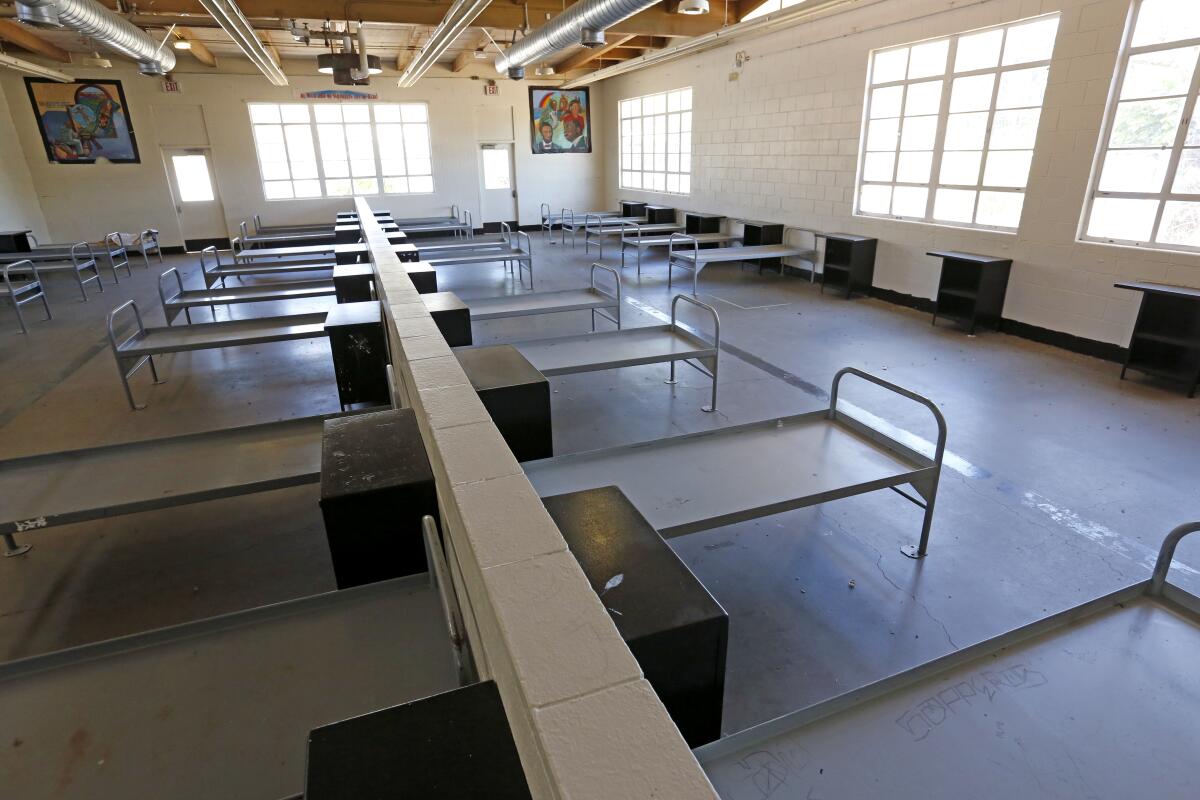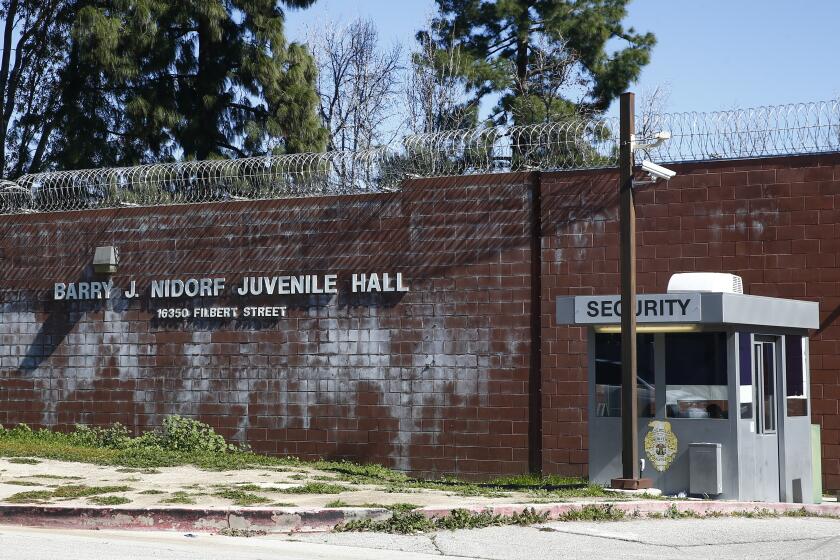Shut down L.A.’s broken juvenile probation. Overhaul proposals are too little, too late

- Share via
The Board of Supervisors’ belated flurry of directives this month to prevent the state-ordered closure of L.A. County’s two juvenile halls was far too little and probably came far too late.
As The Times reported Friday, the California Board of State and Community Corrections notified the county’s interim chief probation officer Thursday that it will decide on April 13 whether to order the closure of the Barry J. Nidorf Juvenile Hall in Sylmar and Central Juvenile Hall in Lincoln Heights because of the abysmal condition of the facilities, the inadequate number of staff and the resulting danger to juveniles and staff alike. The Board of Supervisors and the county Probation Department have until then to bring the facilities into compliance with state standards.
If they fail, new secure accommodations would have to be found for nearly 400 youths accused of serious crimes. And it is almost certain they will fail to repair this catastrophe in fewer than three weeks.
Most of those juveniles suffer from some form of mental illness or deep trauma. Because of chaotic conditions at the detention facilities, few of the youths have had the benefit of schooling or therapy the county is required to provide during their time awaiting resolution of their cases or completion of their sentences.
The state board would be doing no one any favors by keeping the facilities open. They must close, and safe and suitable accommodations for the juveniles must be found. The L.A. supervisors, Probation Department management and a workforce crippled by employees who refuse to come to work have shown repeatedly that they are not up to the task of properly housing and caring for the young offenders in their charge.
Their failure has alarmed their counterparts around the state. Last week, the Chief Probation Officers of California, an organization of the 58 leaders of county probation departments, called for a “narrowly tailored receivership” in L.A. County focused on facilities and staffing.
Los Angeles County government’s unconscionable floundering endangers the lives of the teenagers the county is duty-bound to protect
Their instinct to impose outside management, presumably under court oversight, is on target. But a narrow receivership is also too little and too late.
The department is already obligated to correct horrendous health and safety problems — including juveniles having to urinate on the floors of their cells because they lack adequate access to bathrooms at night — under a settlement agreement with the California Department of Justice. That agreement is also too little, too late. Nor is proposed legislation in Sacramento to create a facilities grant program, exclusively for Los Angeles County to build new juvenile halls, either sufficient or timely.
All of these plans and agreements might have been adequate if the Probation Department’s meltdown were a recent phenomenon, brought on by the pandemic, or the wildfires that threatened several camps, or Gov. Gavin Newsom’s decision to close the state Division of Juvenile Justice and transfer the most serious juvenile offenders to the counties by July 1.
Half of L.A. County Probation Department juvenile division workers don’t come to work, and their unions resist change. The county should push forward and replace the division.
But in fact, the county has allowed the crisis to grow for at least two decades, and the most recent challenges have merely exacerbated the disaster. The shocking conditions in the juvenile halls are symptoms of deeper organizational sickness.
Refusal of probation staff to report to work is nothing new. Massive no-shows have beset the department for years. So has employee misconduct. A decade ago there was a spate of arrests of probation department workers for fraud, theft and excessive force. Allegations of rape and sexual assault of juveniles perpetrated by probation workers go back nearly a half century. Off-duty drunk driving arrests of probation workers were rampant a decade ago and remain a problem. One chief probation officer attempted to crack down on misconduct by requiring that promotion be based on performance and not merely seniority, but he was fired and his successor reversed the policy.
The county long ago signed off on a compressed work schedule that was negotiated for the benefit of workers but undermines therapeutic programs for the juveniles. The Board of Supervisors spent tens of millions of dollars on facilities and programs designed for therapy that cannot be used as intended because of disputes over staff scheduling and seniority. The supervisors have hired and fired a succession of chief probation officers who were not up to the task.
If the Los Angeles County Probation Department did not exist today, no one would re-create it — at least, not as it is.
Most of the failures currently afflicting the Probation Department were flagged by the U.S. Department of Justice in 2006. The county agreed to a host of remedies, but as soon as the fixes were made and the compliance boxes were checked, the department reverted to its former dysfunction.
The supervisors have repeatedly violated the public trust in handling the issue. Last week, they put on the agenda their emergency session to discuss the state board’s letter as “Department Head Performance Evaluations,” an apparent ruse to justify a closed session without notifying the public of the actual subject.
The county’s mistreatment of youths in its care is long-standing and unconscionable. No limited receivership or settlement agreement can fix it. As with the county’s previous debacles in the abusive MacLaren Children’s Center and the deadly Martin Luther King Jr. medical center, the Probation Department’s juvenile division— and not merely a couple of its detention centers — is beyond repair.
It must be closed down and replaced. The only proper discussion for the Board of Supervisors now is how to do it, work with state officials to identify safer quarters and plan the responsible transfer of the juvenile probationers without exacerbating the damage already inflicted on them.
More to Read
A cure for the common opinion
Get thought-provoking perspectives with our weekly newsletter.
You may occasionally receive promotional content from the Los Angeles Times.











